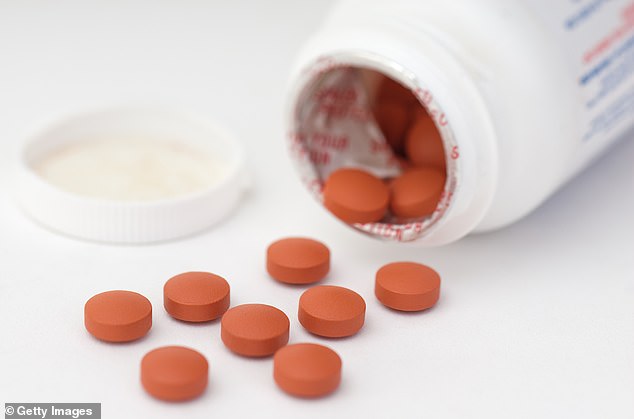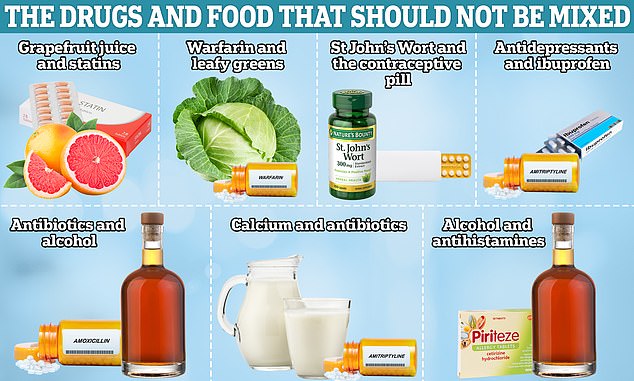Table of Contents
If you are taking more than one medication, you have probably been warned about dangerous drug interactions that you should avoid.
But you may not be aware that we should not only be careful with combining medications… and not only with grapefruit juice and statins.
Mixing foods, drinks, and some herbal remedies with medications can cause a variety of side effects.
Grapefruit juice and statins
Statins are a commonly prescribed medication to help prevent heart attacks and strokes.
They help reduce LDL cholesterol, the “bad” cholesterol.
High levels in the blood can harden and narrow the arteries.
People who are advised to take statins are also often encouraged to make healthy lifestyle changes, such as adding more fruits and vegetables to their diet.
But there is one fruit that people taking statins should be wary of: grapefruit.
According to the NHS, a doctor may advise patients taking statins to avoid eating and drinking grapefruit altogether. Others may be encouraged to consume only small amounts.
Dr Leyla Hannbeck, chief executive of the Association of Independent Multiple Pharmacies, said: “Grapefruit juice should be avoided when taking some cholesterol-lowering medications, such as statins, because it prevents an enzyme needed for statins from breaking down. metabolize in the body.
“As such, it can cause these medications to build up and increase the risk of side effects.”
Side effects of statins can include headaches, dizziness, muscle aches and feeling tired, according to the NHS.

A glass of grapefruit juice can cause aches and pains and even dizziness if you are taking statins, a cholesterol-lowering medication.
Warfarin and green leafy vegetables
Warfarin, used to prevent and treat blood clots, has been commonly prescribed in the UK since the 1950s.
However, while we are all encouraged to eat more leafy greens, such as broccoli and spinach, those taking the medication should be careful with these vegetables, experts say.
“Some green vegetables such as kale, broccoli, and spinach, which are rich in vitamin K, can reduce the effects of warfarin,” Dr. Hannbeck warned.
“Warfarin blocks an enzyme that uses vitamin K,” explains Dr. Dipa Kamdar, a pharmacist and professor at Kingston University in London.
‘Green leafy vegetables contain a fairly high amount of vitamin K. This interacts with warfarin and speeds up its elimination from the body.
“This means that patients who take it have a higher risk of strokes.”
If you want to change your diet, you should tell your doctor so he or she can adjust your warfarin dose, experts say.

Eating too many leafy green vegetables, such as broccoli and spinach, can prevent warfarin (pictured) from doing its job
Warfarin and cranberry juice
Patients taking warfarin should not only be careful with leafy green vegetables.
A refreshing glass of cranberry juice and eating cranberries could also cause problems.
This interaction has the opposite effect of the vitamin K interaction. Instead of stopping the drug from working, it exacerbates its effects.
As a result, patients may experience unexpected or excessive bleeding.
“The reason pharmacists advise against drinking grapefruit juice if you take warfarin is because warfarin thins the blood and grapefruit juice potentiates the effect of warfarin, which increases the risk of bleeding,” Dr. Hannbeck said. .
St. John’s wort and the birth control pill
St John’s Wort is a popular herbal remedy sold over the counter as a treatment for people suffering from depression, although it is not recommended for this use by the NHS.
It is often assumed to be harmless simply because it is a herbal remedy, but pharmacists warn that this is not always the case.
St. John’s wort is an enzyme inducer, meaning it can speed up the breakdown of other substances.
One of those substances is the birth control pill.

Mixing St. John’s wort and the birth control pill increases the chances of someone taking the birth control pill getting pregnant
Dr Kamdar said: “Many people think that St John’s wort is harmless because it is an herb, but it accelerates the breakdown of the contraceptive pill in the body.
‘They both work with the same enzyme and this accelerates the speed of this enzyme. Therefore, the concentration of the birth control pill in the body is reduced and it may not work properly.’
As a result, mixing the two increases the chances of someone taking the birth control pill getting pregnant.
Pharmacists also warn that, somewhat counterintuitively, St. John’s wort may worsen depression if someone is already taking medication for mental illness.
Dr Hannbeck added: “St John’s wort also interacts with some antidepressants such as SSRIs and may increase the risk of side effects, so it should be avoided during treatment.”
Antidepressants and ibuprofen.
Herbal remedies are not the only interaction that people taking antidepressants should be aware of.
A class of antidepressants called selective serotonin reuptake inhibitors (SSRIs) carries a potentially dangerous interaction with anti-inflammatory medications such as the commonly used over-the-counter pain reliever ibuprofen.
Dr Kamdar said: ‘SSRIs and anti-inflammatory painkillers, such as ibuprofen, can increase the risk of bleeding, most commonly in the stomach.

Certain types of antidepressants called selective serotonin reuptake inhibitors (SSRIs) can interfere with anti-inflammatory medications such as ibuprofen.
“Therefore, taking them together may increase the risk of this occurring.”
Bleeding in the stomach can cause dark stools, stomach cramps, feeling tired and dizziness, according to the NHS.
People taking SSRIs should consult their doctor or pharmacist before taking anti-inflammatory pain relievers.
Antibiotics and alcohol.
Pharmacists will, of course, encourage people to avoid alcohol while taking antibiotics.
But this stands out particularly for those taking the antibiotic metronidazole, which is most commonly prescribed after a dental procedure.
Dr. Hannbeck warned that mixing the two could cause side effects, including vomiting and flushing, known as a “disulfiram-like reaction.”
The NHS says: “Do not drink alcohol while you are taking metronidazole, including for two days after stopping it.” This gives the medicine time to leave the body.
‘This is important because metronidazole can react with alcohol and cause a number of side effects. These include feeling unwell, stomach pain, hot flashes, palpitations and headache.’
Calcium and antibiotics.
Older people often take calcium supplements to strengthen bones and prevent fractures.
However, instead of improving your health, calcium supplements can actively harm it by interacting with various medications, pharmacists warn.
These range from antibiotics to medications used to help prevent people from contracting malaria.
Dr Kamdar said: “These types of interactions occur in the stomach and have to do with the absorption of the drug.”
“So there are certain things like this calcium that you have to be careful with when using them with other medications.”
Antibiotics such as doxycycline, which is often prescribed for acne, are among those affected if calcium supplements are taken, pharmacists warn.

Calcium can interact with several medications, from antibiotics to drugs used to prevent malaria, pharmacists warn
But this not only happens with calcium supplements but also with foods rich in this mineral such as milk, cheese and even yogurt.
Dr Hannbeck said drugs belonging to a class of antibiotics called tetracyclines, which includes doxycycline, were particularly vulnerable to this interaction.
“Calcium in dairy products can reduce the effect of these antibiotics by affecting their absorption in the body,” he says.
But Dr. Kamdar added that there are ways to conserve calcium without affecting antibiotics.
“Since this interaction occurs in the stomach, it’s about maintaining a time interval of about an hour,” he says.
Alcohol and antihistamines.
Antihistamines are medications commonly used to relieve allergy symptoms, such as hay fever or reactions to insect bites.
Some antihistamines, such as chlorphenamine, diphenhydramine and hydroxyzine, cause drowsiness, according to the NHS.
Side effects of these medications include reduced coordination, reaction speed and judgment, as well as drowsiness.
And mixing them with alcohol can make these symptoms even more extreme, Dr. Kamdar warns.
She said: “You actually shouldn’t mix alcohol with these drowsy antihistamines because they can make you very sleepy.”


